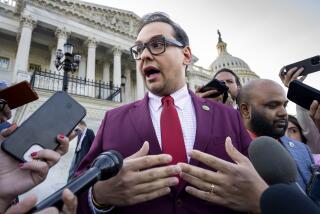Editorial: Outrage over Hinckley’s acquittal changed American law for the worse
- Share via
Thirty-five years after shooting President Ronald Reagan, John W. Hinckley Jr. is a free man, having been released from a mental institution by a federal judge who concluded that Hinckley no longer suffers from the mental disorder that led him to attempt the assassination in 1981. In recent years Hinckley has been able to leave St. Elizabeths Hospital in Washington, D.C., to visit his family. Now he will be able to live full time with his mother in Williamsburg, Va.
But while this may mark the end of Hinckley’s legal case, American law continues to be influenced by public outrage over his acquittal by reason of insanity — and not for the good. The outcry over that verdict, stoked by opportunistic politicians, led to a weakening of the insanity defense and undermined the principle that a defendant shouldn’t be held criminally responsible when his crime is the result of mental illness.
Hinckley was 25 when he shot Reagan with the deranged expectation that attacking the president would impress film star Jodie Foster. Reagan recovered, but another of Hinckley’s four victims, White House press secretary James Brady, suffered lasting brain damage and partial paralysis. (Brady died in 2014.)
A jury acquitted Hinckley after concluding that he satisfied the definition of legal insanity in use in Washington, D.C., at the time: that, because of a mental disease or defect, the defendant “either lacked substantial capacity to conform his conduct to the requirements of the law or lacked substantial capacity to appreciate the wrongfulness of his conduct.”
Even though Hinckley faced many years in a mental institution, his insanity acquittal caused an uproar, one that politicians were eager to inflame. Jurors in the trial were called before a Senate subcommittee and interrogated about whether they understood the judge’s instructions. Congress passed a law narrowing the federal definition of legal insanity and shifting the burden of proof on the question of mental disease to the defendant. State legislatures did likewise, and some adopted a verdict of “guilty but mentally ill” — a concept that is hard to square with the principle that an insane person can’t be criminally responsible for his act.
In the outcry over the Hinckley acquittal, two realities were obscured. One was that the insanity defense was seldom asserted and rarely successful. The other was that defendants acquitted by reason of insanity, far from being set free, were often confined (albeit in a mental institution where they could receive treatment) for longer than they would have been imprisoned if they had been convicted. In Hinckley’s case, it’s possible that, had he been convicted, he would have been released on parole years ago.
Hinckley’s attack on Reagan was a shocking act of violence. But the reaction to it weakened an important legal principle without increasing public safety.
Follow the Opinion section on Twitter @latimesopinion and Facebook
More to Read
A cure for the common opinion
Get thought-provoking perspectives with our weekly newsletter.
You may occasionally receive promotional content from the Los Angeles Times.









